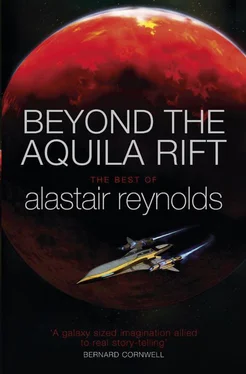You want to see some notes? Here are some notes.
Dimitri escapes .
Dimitri finds Petrova
They go for a walk. They talk about what she did in the past, how she was ridiculed .
They go back to the apartment. He gives her the musical box .
The men come for him. They aren’t interested in Petrova. Dimitri knows that something bad is going to happen to him, but he’s resigned to it—almost happy, knowing that he has let Petrova know she was right .
Only tell story from Dimitri POV. All along there are clues to the fact that any one who came into contact with the Machine ends up a little insane. In fact, it seems to be spreading—just being in contact with the survivors of the mission seems to be having an un-hinging effect .
Make it that Yakov’s madness didn’t start until they were very close to the Matryoshka .
At the end of the story, we find that it isn’t Dimitri who’s escaped, it’s his doctor, who’s gone off the rails so completely that he’s started thinking he was one of the crew. Story needs to be retold as first person to give it that immediacy, and so we aren’t pulling the wool over the reader’s eyes. The doctor has revised the mission files so exhaustively that he started to identify, then assume, the personality of the mission’s sole survivor.
SLEEPOVER
THIS STORY CAME out of a very vague set of notes for a novel that was never to be. I don’t, as a rule, keep huge reams of detailed story ideas lying around. But in this case I’d began serious preparatory work on what would have been the book that came out in place of House of Suns , before deciding (spurred by an email from a reader) that House of Suns was the thing I really wanted to work on next. A year or two later, I’d lost the sense that there was a novel’s worth in this material, but it still seemed interesting enough to warrant expansion into a short story. Here are some of the notes I worked from:
Someone is woken from the sleep because one of the wardens has been killed. At first they don’t remember what has happened. Post-revival amnesia. They’re given a series of refresher lectures about what’s happened to the world and why it’s the way it is. They vaguely remember the world as it was. The world now is beautiful and bleak, a depopulated wilderness with just a few thousand waking wardens to tend to the vast sleeper cubes which dot the landscape .
Meanwhile reality is under constant siege. Weird things keep happening—strange structures in the sky, rifts and dislocations. Spillage from the transcendental war between the AI s, being fought in the interstitial gaps of reality. Humans as a computational burden that can not be allowed .
Story about the accepting of a duty of care. The moral act of duty and self-sacrifice. Would they be given an ultimatum or allowed to return to sleep? What if they found out they had been revived and put back several times, each time refusing to take on the burden?
What single thing would be sufficient to push someone into changing their mind? What would they need to witness or experience? Someone else’s act of self-sacrifice? Evidence of same? Some pathetic act of animal cruelty that makes them realise they can do better than that, being human?
Not to come over all Philip K Dick, but this one actually goes back to a vision. Well, not quite a vision. But in my early teens, during a long wet walk in driving cold rain, soaked to my skin—a typical English summer, in other words—I ended up at the side of a water reservoir somewhere in the Midlands. Jutting out into the water was some kind of treatment facility, consisting of a metal gangway ending in a blocky windowless grey structure rising from the reservoir. Under leaden, miserable skies, confronted by grey waters and grimly impersonal machinery, I had an almost visceral jolt of what the world would be like if only machines were left to look after anything. I might be guilty of exactly the kind of post-hoc rationalisation I already warned about, but I’m as sure as I can be that the grey waters and grey structures of Sleepover’s bleak, depopulated world connect back to that rain-soaked epiphany. But the story’s also about the miraculous human capacity for adaptation to almost any set of circumstances, and somewhere along the line I think it manages to find a rare glimmer of optimism.
VAINGLORY
A LOT OF my stories revolve around art or artists, now that I come to think about it. At the risk of hopeless reductionism, I’m pretty much convinced that my brain was wired for art, rather than science. I’ve never been entirely at ease with numbers, and mathematics has seldom felt like a native language to me. At school, I was expected to go into illustration or some aspect of creative writing. But it was science that pulled me the hardest, and so I learned to work around my analytic limitations while putting art to one side while I trained to become an astronomer. I suppose it was only natural, though, that a latent interest in visual expression would start to seep out into my fiction, whether I wanted to or not. Here, with this tale of a sculptural installation gone somewhat awry, it’s very much to the fore.
TRAUMA POD
THIS WAS A straightforward case of the title coming before the story. I’d read an article about the US military developing the next generation of battlefield medicine, using robotics and telepresence technology to develop a “pod” in which an injured soldier could be placed and operated on, even in the middle of the theatre of war. I filed the name of this “trauma pod” away for future use, and then waited for the story to arrive. Eventually I was invited to write a piece featuring some aspect of “power armour” for an anthology being developed by John Joseph Adams, and it seemed as good a time as any to dust off that story title.
THE LAST LOG OF THE LACHRIMOSA
I KEEP TELLING people that I’m not done with the Revelation Space universe, but in the absence of new novels, the only way to keep delivering on that promise is to write new short stories. Before “Last Log”, the previous one had been “Monkey Suit”, from 2009, so it was high time to produce something new. The story had a long, difficult gestation, taking several years to get straight. I think people sometimes imagine that I’m deliberately holding back from doing more Revelation Space stories, but that couldn’t be further from the truth. The problem is that they’re quite hard to write. Although the Revelation Space universe is huge, spanning thousands of years and hundreds of worlds and cultures, the narrative space, at least from where I’m seated, is already pretty congested. The stories also need to have some functional independence from each other. You have to figure that at least one reader won’t have read anything else by you before, so you can’t overload on backstory and obscure references to other events in the universe.
THE WATER THIEF
ARC, A NEW publishing venture launched under the wing of New Scientist, invited me to submit a short story with a relatively near-future setting. At the time I was deep in the early stages of the Poseidon’s Children sequence of novels, and it seemed natural to dig a little earlier into that future history and take a look at events on Earth in the middle decades of the twenty-first century. I set my story in a kind of transit camp where migrant workers—forced to flee by climate change and resource shortages—earn a crust using cheap but ubiquitous telepresence technology doing menial chores elsewhere on the planet—or in this case, on the Moon. It’s actually a pretty pure example of “Mundane SF”, in that nothing that happens in the story requires any science or technology not already on the drawing boards, if not already with us.
Читать дальше











